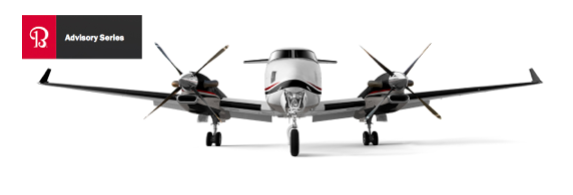Written by Beechcraft: Sales Advisory
Profits and productivity soar thanks to efficiency and flexibility.
Business aviation is the use of a general aviation airplane for a business purpose. It is essential to tens of thousands of U.S. companies of all types and sizes that compete in a marketplace that demands speed, flexibility, efficiency and productivity. The vast majority of these companies—85 percent—are small and mid-size businesses, many of which are based in the dozens of markets across the country where the airlines have reduced or eliminated service.
A company’s decision to use business aviation for any mission depends on a variety of factors, including availability of commercial service in the departing or arrival destinations, the number of sites to be visited in a single day, the number of employees traveling, the need to discuss proprietary matters en route, the need to move specialized equipment and a host of other considerations.
This list explains some of the primary reasons companies use business aviation as a solution to many of their transportation challenges.
1. Accessing communities with little or no airline service
Business aviation serves 10 times the number of communities (more than 5,000 airports) served by commercial airlines (about 500 airports). This means business aviation can allow companies to locate plants or facilities in small towns or rural communities with little or no commercial airline service. Since nearly 100 communities have lost airline service in the past year, this is important.
2. Reaching multiple destinations quickly and efficiently
Companies that need to reach multiple destinations in a single day may use business aviation because that type of mission could be hard or impossible to complete otherwise. Hundreds or thousands of dollars can be saved on hotel rooms, rental cars, meals and other expenses that would be needed to make the same trip over several days via car, train or airline.
3. Supporting the travel needs of many types of company employees
An industry study shows 14 percent of passengers are top company managers. The other 86 percent of business aircraft passengers are marketing and sales personnel, technical experts, other company representatives and customers.
4. Moving equipment
When companies need to immediately move expensive, sensitive or critical equipment, business aviation is often the best solution.
5. Ensuring flexibility
Business people don’t always know in advance where or when opportunities will present themselves. In today’s business environment, companies need to be nimble enough to move quickly. Business aviation provides flexibility for companies that need to ensure employees can respond to changing demands and circumstances.
6. Increasing employee productivity and providing security
Business aviation is a productivity tool—when traveling aboard business aircraft, employees can meet, plan and work en route with traditional office tools like phones and sometimes the Internet. Business aviation also allows employees to discuss proprietary information in a secure environment without fear of eavesdropping, industrial espionage or physical threat.
7. Keeping in contact
Many aircraft have technology that allows employees to remain in communication throughout the duration of their flight. This can be critical for companies managing a rapidly changing situation.
8. Providing a return to shareholders
Studies have found businesses which use business aviation as a solution to some of their transportation challenges return more to shareholders than companies in the same industry that do not use business aviation.
9. Schedule predictability
More than 3 percent of all commercial airline flights are cancelled. Nearly one quarter are delayed. Today, because many commercial airlines fly at higher capacities with fewer flights, if your flight is cancelled or a delay causes you to miss your connection, the odds of you getting on the next flight are significantly reduced. When the future of a company and its employees is dependent upon you arriving on time, business aviation is an important tool.
Beechcraft has been crafting and supporting globally renowned business aircraft, including King Air turboprops and piston-engine Baron and Bonanza models, since 1932. Since then, they’ve built more than 54,000 aircraft, with more than 36,000 still in use today. Beechcraft show you how business aircraft can save your company money and make you and your team more productive. Check out their complete line at www.beechcraft.com or call 800.949.6640 for more information on which business aircraft could help you meet your goals.


